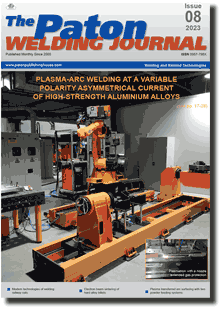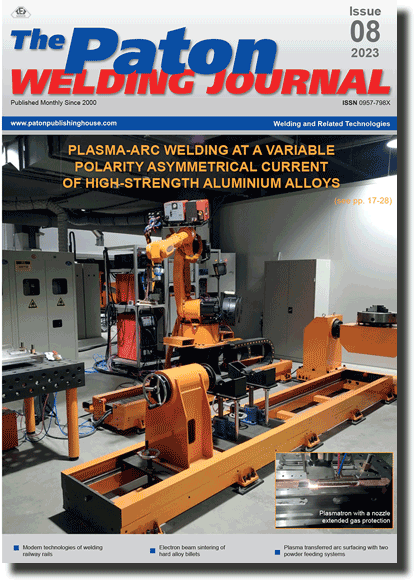| 2023 №08 (03) |
DOI of Article 10.37434/tpwj2023.08.04 |
2023 №08 (05) |

The Paton Welding Journal, 2023, #8, 36-43 pages
The influence of iron on the structure and technological characteristics of Cu–Mn–Co brazing filler metal
S.V. Maksymova, P.V. Kovalchuk ,V.V. Voronov, I.I. Datsiuk
E.O. Paton Electric Welding Institute of the NASU. 11 Kazymyr Malevych Str., 03150, Kyiv, Ukraine. E-mail: maksymova.svitlana15@ukr.netAbstract
The results of complex studies on the brazing filler metal of the Cu–Mn–Co system alloyed with iron in the range of 1…5 wt. % are presented. The melting point was determined through calculation, and it was shown that increasing the concentration of iron from 1 to 5 wt. % leads to a slight (from 912 to 923 °C) increase in the temperature of the solidus and a significant increase in the temperature of the liquidus (from 931 to 1027 °C). At the same time, the melting temperature range expands to 104 °C. The results of experimental studies on the spread of brazing filler metal on Kovar and corrosion-resistant steel have established that an increase in the iron concentration up to 5 % contributes not only to an increase in the temperature of the liquidus but also to an increase in the spread area, which is due to the melting temperature of a copper-based solid solution. Local micro-X-ray spectral analysis established a discrete distribution of constituent elements and showed that the brazing filler metal, after spreading, contains two solid solutions: copper-based and manganese-based. The research results on the Kovar-corrosion-resistant steel brazed joints have demonstrated that the addition of iron to the Cu–Mn–Co–Fe alloy leads to an increase in microhardness and shear strength. 22 Ref., 5 Tabl., 11 Fig.
Keywords: copper–manganese–cobalt–iron brazing filler metal, melting temperature range, X-ray microanalysis, structure, microhardness, wetting angle, solid solution
Received: 08.06.2023
Accepted: 07.08.2023
References
1. Mai, T.A., Spowage, A.C. (2004) Characterisation of dissimilar joints in laser welding of steel-kovar, copper-steel and copper-aluminium. Materials Science and Engineering, A, 374, 1-2, 224-233. https://doi.org/10.1016/j.msea.2004.02.0252. Fadhali, M.M. A., Zainal, S.J., Munajat Y., Jalil, A., Rahman, R. (2010) Laser welding characterization of kovar and stainless steel alloys as suitable materials for components of photonic devices packaging. AIP Conference Proceedings, 1217, 147-152. https://doi.org/10.1063/1.3377802
3. Kaletina, Yu.V., Efimova, E.D., Romanov, M.K. (2014) Problems of weldability of parts made of austenitic steel 12Kh18N10T and precision alloy 29NK. Metal Science and Heat Treatment of Metals, 6, 26-29 [in Russian]. https://doi.org/10.1007/s11041-014-9751-8
4. Sun, Z., Moisio, T. (1994) Melting ratio in laser welding of dissimilar metals. J. Mater. Sci. Lett, 13, 980-982. https://doi.org/10.1007/BF00701444
5. Xin, C., Jiazhen, Y., Li, N., Liu, W., Du, J., Cao, Y., Shi, H. (2016) Microstructural evolution during the brazing of Al2O3 ceramic to kovar alloy by sputtering Ti/Mo films on the ceramic surface. Ceramics International, 42, 11, 12586-12593. https://doi.org/10.1016/j.ceramint.2016.04.094
6. Baghjari, S.H., Gholambargani, M., Akbari Mousavi S.A. (2019) Application of the pulsed Nd:YAG laser welding to investigate the effect of laser beam position on weld characteristics of AISI 420 stainless steel to kovar alloy. Lasers Manuf. Mater. Process. 6, 14-25. https://doi.org/10.1007/s40516-018-0078-y
7. Qiao, G.J., Wang, H.J., Gao, J.Q., Jin, Z.H. (2005) Brazing Al2O3 to kovar alloy with Ni/Ti/Ni interlayer and dramatic increasing of joint strength after thermal cycles. Materials Science Forum, 486-487, 481-484. https://doi.org/10.4028/www.scientific.net/MSF.486-487.481
8. Fang, Y.J., Jiang, X.S., Mo, D.F, Song, T.F, Shao, Z.У., Zhu, D.G., Zhu, M.H., Luo, Z.P. (2018) Microstructure and mechanical properties of electron beam-welded joints of titanium TC4 (Ti-6Al-4V) and kovar (Fe-29Ni-17Co) alloys with Cu/Nb multi-interlayer. Advances in Materials Science and Engineering, 2018, 1-11. https://doi.org/10.1155/2018/2042871
9. Sun, Z., Ion, J.C. (1995) Laser welding of dissimilar metal combinations. J. Mater. Sci., 30, 4205-4214. https://doi.org/10.1007/BF00361499
10. Xiao, R., Dong, P., Chen, K. (2009) Laser beam welding of dissimilar materials. ICALEO 2009-28th International Congress on Applications of Lasers and Electro-Optics, Orlando, FL, USA, 102, 660-665. https://doi.org/10.2351/1.5061625
11. Wang, J.L., Yang, Z.W., Wang, Y., Wang, D.P., Li, H.J. (2021) Microstructural stability and mechanical properties of Al2O3/ Kovar 4 J34 joint vacuum brazed using Ag-5Cu-1Al-1.25Ti (wt.%) filler metal. J. of Manufacturing Processes, 72, 553-564. https://doi.org/10.1016/j.jmapro.2021.10.057
12. Ermolaev, G.V., Kvasnitsky, V.V., Kvasnitsky, V.F., Maksymova, S.V. et. al. (2015) Metal brazing. Textbook. Mykolaiv, NUK [in Ukrainian].
13. Sally A. (1959) Manganese. Moscow, Metallurgizdat [in Russian].
14. Massalski, T.B. (1990) Вinary alloy phase diagrams. American Society for metals. Ohiо, Metals Park, ASM International, СD.
15. Steel and Alloy Grader. http://www.splav-kharkov.com
16. Practical software for materials properties. https://www. sentesoftware.co.uk/jmatpro
17. Saunders, N., Guo, Z., Li, X., Miodownik, A.P., Schillé, J-Ph. (2003) Using JMatPro to model materials properties and behavior. JOM, 55, 12, 60-65. https://doi.org/10.1007/s11837-003-0013-2
18. Schillé, J-Ph., Guo, Z., Saunders, N., Miodownik, P.A. (2011) Modeling phase transformations and material properties critical to processing simulation of steels. Materials and Manufacturing Processes, 26, 1, 137-143. https://doi.org/10.1080/10426910903153059
19. (1997) State diagrams of binary metallic systems. Lyakishev N.P. (Ed.), Vol. 2, Moscow, Mechanical engineering.
20. (2007) Brazing handbook 5th ed Miami. American Welding Society.
21. Maksymova, S.V., Kovalchuk, P.V., Voronov, V.V. (2021) Vacuum вrazing of kovar-molybdenum dissimilar joints. The Рaton Welding J., 7, 13-18. https://doi.org/10.37434/tpwj2021.07.03
22. Maksymova, S.V., Kovalchuk, P.V., Voronov, V.V. (2021) Influence of Co on structure and mechanical properties of kovar-stainless steel brazed joints. Metallofiz. Noveishie Tekhnol., 43(4), 553-566 [in Ukrainian]. https://doi.org/10.15407/mfint.43.04.0553
Suggested Citation
S.V. Maksymova, P.V. Kovalchuk ,V.V. Voronov, I.I. Datsiuk (2023) The influence of iron on the structure and technological characteristics of Cu–Mn–Co brazing filler metal. The Paton Welding J., 08, 36-43.The cost of subscription/purchase order journals or individual articles
| Journal/Currency | Annual Set | 1 issue printed |
1 issue |
one article |
| TPWJ/USD | 384 $ | 32 $ | 26 $ | 13 $ |
| TPWJ/EUR | 348 € | 29 € | 24 € | 12 € |
| TPWJ/UAH | 7200 UAH | 600 UAH | 600 UAH | 280 UAH |
| AS/UAH | 1800 UAH | 300 UAH | 300 UAH | 150 UAH |
| AS/USD | 192 $ | 32 $ | 26 $ | 13 $ |
| AS/EUR | 180 € | 30 € | 25 € | 12 € |
| SEM/UAH | 1200 UAH | 300 UAH | 300 UAH | 150 UAH |
| SEM/USD | 128 $ | 32 $ | 26 $ | 13 $ |
| SEM/EUR | 120 € | 30 € | 25 € | 12 € |
| TDNK/UAH | 1200 UAH | 300 UAH | 300 UAH | 150 UAH |
| TDNK/USD | 128 $ | 32 $ | 26 $ | 13 $ |
| TDNK/EUR | 120 € | 30 € | 25 € | 15 € |
AS = «Automatic Welding» - 6 issues per year;
TPWJ = «PATON WELDING JOURNAL» - 12 issues per year;
SEM = «Electrometallurgy Today» - 4 issues per year;
TDNK = «Technical Diagnostics and Non-Destructive Testing» - 4 issues per year.


